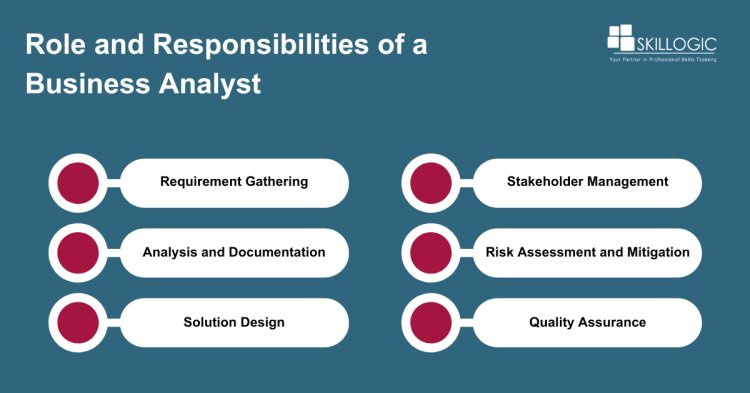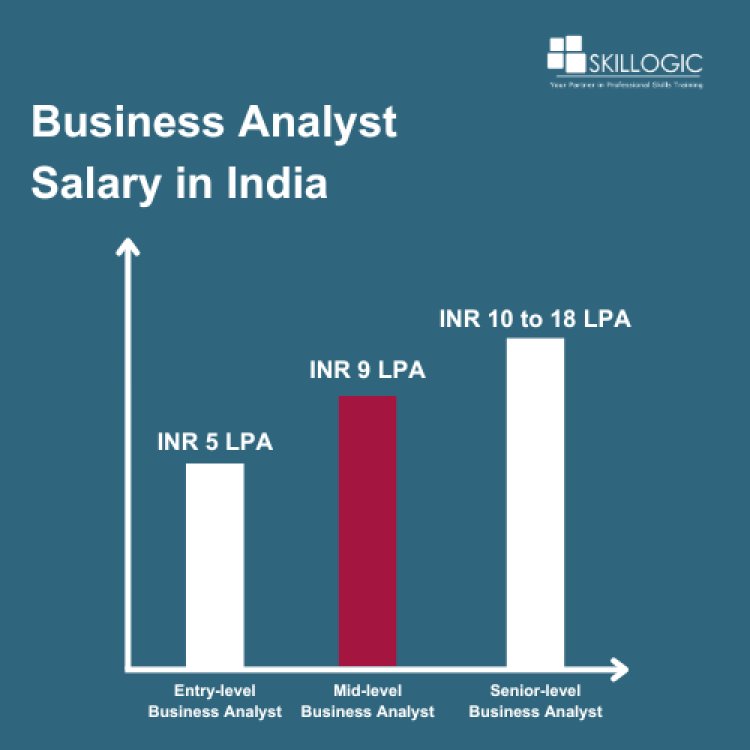Business Analyst Salaries in India- 2024 Edition
Explore the latest trends in business analyst salaries across India for 2024, including key factors influencing compensation. Gain insights into industry demands and growth opportunities for professionals in this field.

In the dynamic realm of business analysis, where every decision is rooted in data-driven insights, the role of a Business Analyst (BA) stands paramount. As the Indian economy continues its trajectory of growth and digital transformation, the demand for skilled professionals in this domain remains robust.
According to a report by Allied Market Research, the global business analytics market achieved a value of $225.3 billion in 2023, with projections suggesting it will reach $665.7 billion by 2033. This growth trajectory indicates a compound annual growth rate (CAGR) of 11.6% from 2024 to 2033. However, with demand comes the inevitable question: what is the compensation landscape for Business Analysts in India in 2024? Let's delve into this intriguing inquiry.
Exploring Insights: The Essence of Business Analytics
Business analytics involves the exploration of data to uncover insights and make informed decisions within organizations. Its popularity has surged due to its ability to drive strategic initiatives, enhance operational efficiency, and gain competitive advantage through data-driven decision-making.
As per a report from Maximise Market Research, the Business Analytics Market achieved a value of around US$ 78.48 billion in 2022. The market is expected to witness a steady annual growth rate of 7.5% from 2023 to 2029, culminating in total revenue nearing US$ 130.21 billion.
Recent advancements in technology, particularly in artificial intelligence and machine learning, have propelled business analytics to new heights, enabling real-time analytics, predictive modeling, and personalized customer experiences.
Refer:
- Business Analyst Vs Business Analytics Expert
- Business Intelligence Vs Business Analytics – Comparison
- How To Become A Business Analytics Expert?
Understanding the Role and Responsibilities of a Business Analyst
A business analyst plays a crucial role in the success of a business by bridging the gap between the stakeholders and the technology team. Their primary responsibility is to analyze the organization's processes, systems, and objectives and then propose solutions that align with the business goals. Here are the key roles and responsibilities of a business analyst:
- Requirement Gathering: One of the main responsibilities of a business analyst is to collect and document requirements from stakeholders. This involves conducting interviews, workshops, and surveys to understand the needs and objectives of the business.
- Analysis and Documentation: Business analysts analyze the gathered requirements and document them clearly and concisely. This documentation serves as a blueprint for the development team and ensures that everyone has a common understanding of the project scope.
- Solution Design: Based on the requirements gathered, business analysts collaborate with stakeholders and technical teams to design solutions that address business needs. This may involve creating process flows, data models, and other relevant documentation to illustrate the proposed solution.
- Stakeholder Management: Business analysts act as a liaisons between different stakeholders, including business users, project managers, developers, and testers. They facilitate communication and ensure that all parties are aligned throughout the project lifecycle.
- Risk Assessment and Mitigation: Business analysts identify potential risks and issues that may arise during the project and work proactively to mitigate them. This involves conducting risk assessments, developing contingency plans, and communicating risks to stakeholders.
- Quality Assurance: Business analysts are involved in ensuring the quality of the final product or solution. They collaborate with testing teams to define test cases, validate requirements, and verify that the delivered solution meets the business needs.

Demand for Business Analytics in India:
In today's rapidly evolving business landscape, the demand for business analytics in India has become increasingly pronounced across various industries. From retail to healthcare, finance to manufacturing, virtually every sector is recognizing the transformative power of data-driven insights. Here's a closer look at why business analytics is in high demand across industries:
- Retail: In retail, understanding consumer behaviour is key to success. Business analytics enables retailers to analyze vast amounts of customer data to identify trends, preferences, and buying patterns. This information helps in targeted marketing campaigns, personalized recommendations, optimizing inventory management, and enhancing the overall customer experience.
- Healthcare: The healthcare industry generates vast amounts of data through patient records, treatment outcomes, and medical research. Business analytics helps healthcare providers improve patient care by identifying areas for operational efficiency, predicting disease outbreaks, optimizing resource allocation, and even developing personalized treatment plans through predictive analytics.
- Finance: In the finance sector, accurate data analysis is critical for risk management, fraud detection, and investment decision-making. Business analytics enables financial institutions to assess market trends, evaluate portfolio performance, detect anomalies in transactions, and comply with regulatory requirements effectively.
- Manufacturing: Manufacturers can leverage business analytics to optimize production processes, reduce costs, and improve product quality. By analyzing data from sensors, supply chain operations, and customer feedback, manufacturers can streamline operations, forecast demand more accurately, and identify opportunities for process improvements.
- Telecommunications: Telecommunications companies deal with vast amounts of data related to network performance, customer usage patterns, and market trends. Business analytics helps these companies optimize network infrastructure, improve customer service, identify new revenue streams, and anticipate customer churn through predictive modeling.
- Technology: Technology companies rely on business analytics to gain insights into user behaviour, improve product development processes, and drive innovation. By analyzing data from user interactions, market trends, and competitor activities, tech firms can make data-driven decisions to stay ahead in a highly competitive industry.
Skills Impacting the Business Analyst Salary In India
Several skills can impact the salary of a business analyst in India. Here are some key ones:
- Technical Proficiency: Strong skills in data analytics tools and programming languages like Python, R, SQL, and tools like Tableau, Power BI, or SAS are essential. The depth of proficiency in these tools can significantly impact salary levels.
- Statistical Knowledge: A deep understanding of statistical methods and techniques is crucial for analyzing data effectively. Skills in areas such as regression analysis, hypothesis testing, and predictive modeling can command higher salaries.
- Machine Learning and AI: Proficiency in machine learning algorithms and artificial intelligence techniques is increasingly in demand. Expertise in areas like deep learning, natural language processing, and computer vision can boost salary prospects.
- Domain Knowledge: Knowledge of the specific industry or domain in which the business operates can be valuable. Understanding the nuances of sectors like finance, healthcare, e-commerce, or marketing allows for more insightful analysis and can lead to higher pay.
- Communication Skills: The ability to communicate complex analytical findings in a clear and understandable manner to non-technical stakeholders is highly valued. Professionals with strong communication skills often command higher salaries as they can bridge the gap between technical analysis and business decision-making.
- Problem-Solving Skills: Employers value analysts who can identify business problems, formulate analytical solutions, and implement them effectively. Strong problem-solving skills contribute to increased efficiency and innovation, which can lead to higher salaries.
- Project Management: The capability to manage analytics projects from conception to implementation is valuable. This includes skills in project planning, resource allocation, risk management, and stakeholder coordination, all of which can impact salary levels.
- Continuous Learning and Adaptability: The field of business analytics is rapidly evolving with new tools, techniques, and methodologies emerging regularly. Professionals who demonstrate a commitment to continuous learning and adaptability to new technologies tend to command higher salaries.
- Experience: Finally, experience plays a significant role in determining salary levels. Professionals with several years of experience in business analytics, especially in leadership or management roles, typically command higher compensation packages.
Business Analyst Salary in India: An Overview
The salary of a Business Analyst (BA) in India can vary significantly depending on factors such as location, industry, company size, and level of experience. Here's an overview of the typical salary ranges for entry-level, mid-level, and senior-level Business Analyst positions in India:
Entry-level Business Analyst Salary:
- Entry-level Business Analysts salary in India can expect INR 5,00,000 per annum according to a Glassdoor report. This typically includes fresh graduates or individuals with less than two years of experience in the field.
- The exact salary can vary based on the candidate's educational background, relevant internships, and skills.
Mid-level Business Analyst Salary:
- Mid-level Business Analysts salary in India with around 2-5 years of experience can earn from INR 9,05,000 per annum according to a Glassdoor report.
- Professionals at this level are expected to have a deeper understanding of business processes, industry trends, and analytical tools, which contributes to higher compensation.
Senior-level Business Analyst Salary:
- Senior Business Analysts salary in India, with over 5 years of experience and significant expertise in the field, can command salaries ranging from ₹10,00,000 to ₹18,00,000 or more per annum according to a Glassdoor report.
- Senior BAs often play strategic roles in organizations, providing critical insights for decision-making, leading teams, and driving business growth, which justifies the higher compensation.

Refer:
- Business Analytics Expert in India?
- Business Analytics Course Fee in India?
- Business Analytics Scope in India
Business Analyst Salaries Across Top Companies in India
Experienced Business Analysts often command generous compensation packages from established companies and industry leaders. As your prior experience in the field increases, so does your value in the job market. Below is a compilation of average salaries for Business Analyst roles in different organizations in India.
Listed below are IT companies in India alongside the average salary for Business Analyst positions.
- The salary of a business analyst at TCS (Tata Consultancy Services) ranges from INR 7 LPA according to a Glassdoor report.
- The salary of a business analyst at Infosys ranges from INR 6,48,810 per year according to an Indeed report.
- The salary of a business analyst at Wipro ranges from INR 5.0 LPA to INR 10.0 LPA according to a Glassdoor report.
- The salary of a business analyst at Accenture ranges from INR 8,39,172 per year according to a Indeed report.
- The salary of a business analyst at IBM India ranges from INR 8,25,076 per year according to a Indeed report.
- The salary of a business analyst at Deloitte India ranges from INR 7,19,972 per year according to an Indeed report.
- The salary of a business analyst at Capgemini ranges from INR 11.2 LPA according to a Glassdoor report.
- The salary of a business analyst at Cognizant ranges from INR 8,68,250 per year according to an Indeed report.
- The salary of a business analyst at HCL Technologies ranges from INR 8, 45,178 per year according to an Indeed report.
- The salary of a business analyst at Amazon India ranges from INR 10,09,255 per year according to an Indeed report.
Business Analyst Salaries across Indian Cities
The salary of Business Analysts in India is impacted by a multitude of factors, including the company's size and prestige, geographical location, educational qualifications, specialized job responsibilities, and accumulated work experience. Below are the anticipated salary ranges for Business Analyst roles in various cities across India in 2024.
- The salary of a business analyst in Bangalore ranges from INR 9,80,000 per year according to a Glassdoor report.
- The salary of a business analyst in Chennai ranges from INR 74,6,503 per year according to a Glassdoor report.
- The salary of a business analyst in Pune ranges from INR 10,00,000 per year according to a Glassdoor report.
- The salary of a business analyst in Hyderabad ranges from INR 8,80,000 per year according to a Glassdoor report.
- The salary of a business analyst in Delhi ranges from INR 8,50,000 per year according to a Glassdoor report.
- The salary of a business analyst in Mumbai ranges from INR 9,50,000 per year according to a Glassdoor report.
- The salary of a business analyst in Jaipur ranges from INR 5,47,04 per year according to a Glassdoor report.
- The salary of a business analyst in Ahmedabad ranges from INR 5,50,000 per year according to a Glassdoor report.
- The salary of a business analyst in Kolkata ranges from INR 7,08,662 per year according to a Glassdoor report.
- The salary of a business analyst in Gurgaon ranges from INR 9,00,000 per year according to a Glassdoor report.

Factors Influencing the Business Analyst Salaries in India
Several factors influence business analyst salaries in India.
Experience: The level of experience plays a significant role in determining salaries. Junior business analysts typically earn less than mid-level or senior analysts.
Skillset: Proficiency in various skills such as data analysis, requirements gathering, stakeholder management, and industry-specific knowledge can influence salary levels. Advanced skills in programming languages, data visualization tools, and business intelligence platforms may command higher salaries.
Education: A bachelor's degree is typically required for entry-level positions, but a master's degree or relevant certifications such as Certified Business Analysis Professional (CBAP) can enhance earning potential.
Industry: Business analysts may work in various industries such as IT, finance, healthcare, or retail. Salaries can vary based on the industry due to differences in demand, complexity of projects, and revenue generation potential.
Location: Salaries can vary significantly based on the city or region within India. Metro cities like Bangalore, Mumbai, and Delhi generally offer higher salaries compared to smaller cities due to the cost of living.
Company size: Business analyst salaries may differ based on the size and financial health of the company. Large multinational corporations often offer higher salaries and additional benefits compared to small or medium-sized enterprises.
Demand and Supply: Market demand for business analysts and the supply of qualified professionals can impact salaries. Industries experiencing high growth or undergoing digital transformation may offer higher salaries to attract talent.
Negotiation Skills: An individual's ability to negotiate salary packages can also influence their earnings. Candidates who effectively negotiate compensation packages may secure higher salaries and additional perks.
Specialization: Business analysts may specialize in areas such as financial analysis, product management, or data analytics. Specialized skills in niche areas can command higher salaries due to the expertise required.
Refer:
- Business Analytics Course Fee in Chennai
- Business Analytics Course Fee in Hyderabad
- Business Analytics Course Fee in Bangalore
Business Analytics Future in India:
The future of business analytics in India appears promising, with several factors contributing to its growth and evolution:
Increasing Adoption: Indian businesses across various sectors are increasingly recognizing the value of data-driven decision-making. As a result, the adoption of business analytics tools and techniques is expected to rise significantly.
Technological Advancements: With advancements in technologies such as artificial intelligence, machine learning, and big data analytics, businesses in India have access to more sophisticated tools for analyzing data and deriving actionable insights.
Government Initiatives: The Indian government has been actively promoting initiatives such as Digital India and Make in India, which are driving digital transformation across industries. These initiatives create an environment conducive to the growth of business analytics by encouraging the use of technology and data.
Rise of Startups: India has seen a proliferation of startups specializing in data analytics, offering innovative solutions to businesses of all sizes. These startups contribute to the growth of the analytics ecosystem by providing specialized services and products.
Talent Pool: India boasts a large pool of skilled professionals in the fields of data science, statistics, and analytics. With the increasing demand for analytics talent, there are ample opportunities for individuals to upskill and pursue careers in this domain.
Industry-specific Applications: Different industries in India, such as e-commerce, banking, healthcare, and telecommunications, are leveraging business analytics in unique ways to optimize operations, enhance customer experiences, and drive growth.
Global Competitiveness: As Indian businesses strive to compete on a global scale, leveraging analytics for strategic decision-making becomes essential. Business analytics enables companies to stay competitive by identifying market trends, understanding customer behaviour, and optimizing processes.
Business Analysts in India command a competitive salary, especially in the IT and e-commerce sectors, where companies offer attractive compensation packages to qualified candidates who can contribute effectively to their organizations. In addition to traditional qualifications and professional experience, holding advanced certifications in Business Analysis can significantly enhance one's chances of securing lucrative positions with top-tier salaries.
If you aspire to upgrade your career in Business Analytics then enrol in the SKILLOGIC Institute, a leading global training provider offering specialized certification programs across various fields such as Project Management, Quality Management, Cyber Security, Software Development, and Business Analytics. With over a decade of proven success, SKILLOGIC® has established itself as a pioneer in the industry, catering to a diverse international learner base of over 100+ learners. Their extensive portfolio includes more than 25 accreditations and partnerships, supported by a dedicated team of over 100 experienced instructors.
SKILLOGIC provides expert-led certification courses in Six Sigma, PMP, Cybersecurity, and Business Analytics. Known for its high-quality training, the institute offers valuable industry insights. With more than a decade of experience, SKILLOGIC’s Business Analyst course is available offline in Bangalore, Chennai, Pune, and Hyderabad, making learning accessible across India.

0
788